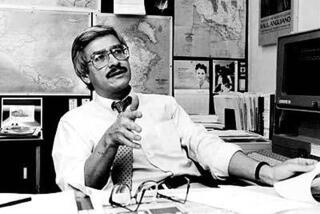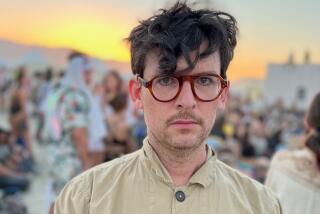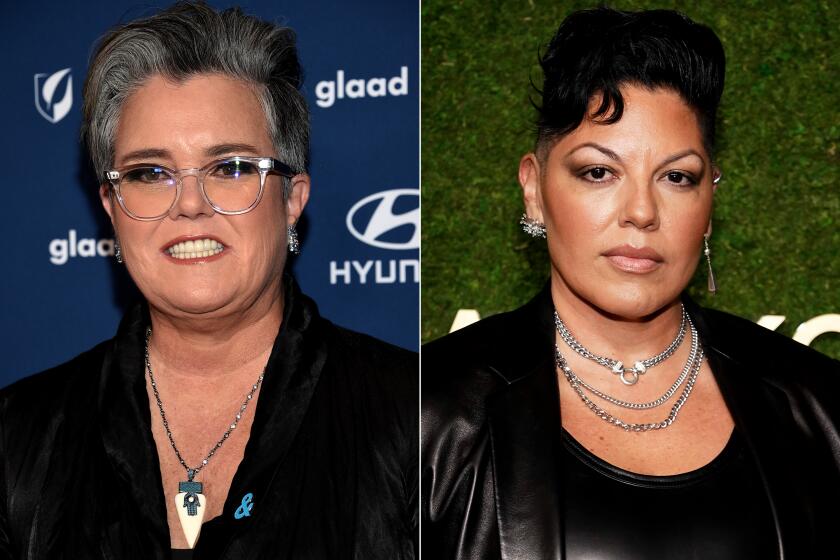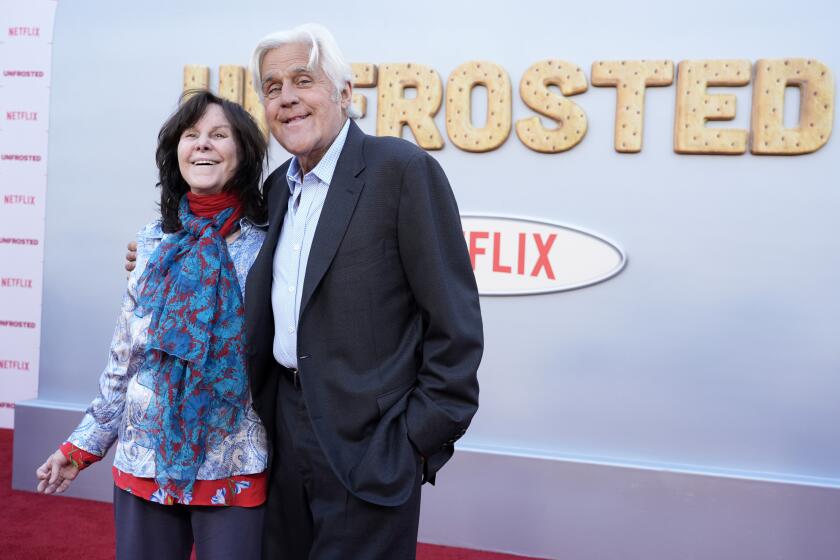On the Media: Joe Frank gets personal
A giant hunk of matzo and egg hangs there on the end of the fork. But every time the man wielding the gooey helping brings it toward his mouth, something really important comes to his mind. The fork descends and Joe Frank, still hungry, takes off in another direction.
It’s been nearly a decade since his last regular program on KCRW-FM, where Frank created a sensation with strange, tragic-comic dramas that sounded like nothing else on radio.
Today, Frank still has a lot to say. He’s doing it on Facebook, where he has 3,600 friends, and in occasional one-man shows. And, today, from a booth at Izzy’s Deli in Santa Monica, he’s decided to unload something more about himself, the man behind the dark performance persona.
Frank has been struggling with his health, as he has repeatedly in his adult life, he says. At 72, he is bridling under the limitations and small degradations of growing older. Don’t hold that door, or give up your seat for him. Despite the cane, he can manage just fine, thank you.
He wants people to know that his frequently bleak worldview didn’t just spring out of the ether. He experienced enough suffering, both in himself and many others, to doubt the existence of God. Not that anything is that simple in Joe Frank’s world; a minute later he’ll tell you about the time a friend called to kid him about eating Chef Boyardee spaghetti, just as he had his first can of the stuff in decades. Could that prove there’s a higher power?
Frank didn’t really want, or need, to do any explaining back when he was winning the Peabody, being recognized by the likes of film director Francis Ford Coppola and inspiring young radio provocateurs such as Ira Glass, who went on to create “This American Life.” But now he has decided it’s time to tell a little more about himself.
“Maybe it will help to inform other people and explain just why these programs were the way they were; why this dark vision,” he said. “Some people are kind of unforgiving, incredulous. They ask, ‘What is the matter with you? Why can’t you be more positive, more optimistic?’”
The story doesn’t come out in any particular order. But it begins with an epically unhappy family life. His father was a successful businessman, a shoe manufacturer who escaped the Nazis and rebuilt his company in America. Frank was just 5 years old when his father died of kidney failure. But he was told that his parents became so alienated from each other that his father, at the end of his life, would communicate with his mother only via written notes. When Frank was a teenager, his mother slogged through depressions so deep that Joe worried she wouldn’t return from extended walks she took in the woods.
Frank’s own serious medical problems began when he was a college student at Hofstra. He developed testicular cancer and recalls repeated cobalt radiation treatments as the most painful thing he ever experienced.
Decades later, in the early 1990s, when his radio work had gained acclaim and spread to public stations across the country, he got sick again. This time it was bladder cancer. A doctor told him he’d had a good life.
More recently, Frank suffered kidney failure, endured a couple of years of dialysis and, five years ago, a kidney transplant. Now the drugs he takes to keep his body from rejecting the new organ make him susceptible to infection. He’s been to the hospital so many times that girlfriend Michal Story (who also manages his website and produces his live shows) collects his admission wristbands.
Frank had begun as a Pacifica radio volunteer in New York. Later, he moved to National Public Radio, where he created edgy radio dramas for “NPR Playhouse.” KCRW’s then-station manager, Ruth Seymour, recognized a spark of genius and invited him to Santa Monica in 1986.
He drew on many sources for his programs — random phone calls to strangers, intimate conversations with friends and improvisations he staged with a troupe of actors. Frank would splice the odds and ends together, along with dance beats or hypnotic techno music. He’d edit hours of material down to a single hour each week.
“I loved,” he said, “going into this otherworldly kind of place.”
At his best, Frank transcended his own demons, relying on a rich sense of the absurd and ample doses of self-deprecation. A performance a couple years ago at club Largo demonstrated the point.
Riffing beside a seven-piece band in “Just an Ordinary Man,” our faithful narrator described his psychological suffering. His embrace of his own pain became so complete he approached a crippled stranger in a bar and explained that his own “deformity” exceeded that of the man, who could not walk.
“Usually at this point, the cripple and I will get into an argument,” Frank said. As the audience erupted in laughter, he added: “He’ll say, ‘What’s the matter with you?’”
The piece ended with a bit of poetry — “Am I the navigator or the drowned man or a microbe on a grain of sand?” — and Frank moving haltingly around the stage beside a single, lithe dancer.
That sort of jarring elegance kept listeners coming back to KCRW each week. Frank created several programs, “Work in Progress,” “In the Dark,” “Somewhere Out There,” and “The Other Side.” The work continued, Frank said, until he had a falling out with Seymour, who had long been his champion and given him plenty of space to create. (He declined to go into detail about what went wrong.)
KCRW, now under Seymour’s successor, Jennifer Ferro, continues to embrace Frank as one of its trailblazers. The station, at 89.9 FM, recently replayed some of his shows, carries recordings on its website and arranged for a live performance at The Village, the West L.A. recording studio where the Rolling Stones and other greats laid down classic songs.
The artist, meanwhile, has built new platforms for his work. A collection of 230 of his programs can be found at his own website, joefrank.com. He has been on Facebook for about a year. He posts descriptions and ruminations, usually just a paragraph or two. Like his radio work, the scenes have more to do with invention than biography.
“I do it to remain creative and to keep on churning out work and to reach an audience,” he said. “It’s comparable to radio, though not in the size of the audience.”
The Facebook posts usually inspire dozens of jokes, atta-boys and occasional jabs, urging Frank not to wallow on the dark side. He’s cool with all of that. Just don’t be one of those “friends” who tries to take up his narratives and sound like him. “I find that tedious,” he said.
He’s thinking all the posts may help him form thoughts for a book he has been working on. But he’ll write that himself, beginning, middle and end. “You be you,” he said. “I’ll be me.”
Twitter: latimesrainey
More to Read
The biggest entertainment stories
Get our big stories about Hollywood, film, television, music, arts, culture and more right in your inbox as soon as they publish.
You may occasionally receive promotional content from the Los Angeles Times.







